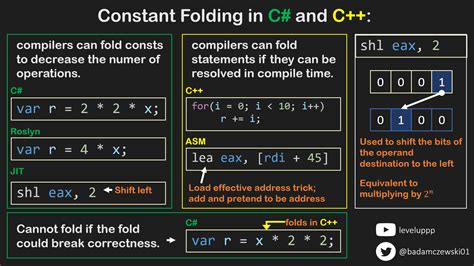Constant folding is a term that might sound highly technical and arcane to many, yet it’s an integral part of optimizing compilers for any high-performance code, particularly in C and C++. The concept is simple: a compiler evaluates constant expressions at compile time rather than runtime, thereby producing more efficient code. But what happens when the default compiler choices don’t quite align with your performance needs? This is where custom constant folding can make a significant difference. Custom constant folding allows developers to fine-tune and exploit specific CPU instructions to achieve greater efficiency, something that is especially valuable in high-frequency trading systems where saving nanoseconds can result in significant gains.
The idea of leveraging custom constant folding inevitably brings up discussions about the pros and cons of various approaches. For instance, one community member remarked on the utility of inline assembly or using compiler intrinsics to achieve optimization. Intrinsics, provided by many modern compilers, offer a bridge between raw assembly code and higher-level languages like C/C++. Intrinsics can be used to invoke specific machine instructions directly within your code. Here’s an example to appreciate the integration of an intrinsic call to perform a square root operation on a SIMD vector in C++:
#include <xmmintrin.h>
__attribute__((noinline))
__m128 test(const __m128 vec) {
return _mm_sqrt_ps(vec);
}
__m128 call_test() {
return test(_mm_setr_ps(1.f, 2.f, 3.f, 4.f));
}
Using intrinsics like _mm_sqrt_ps allows developers to harness the performance muscle of SIMD (Single Instruction, Multiple Data) capabilities in modern CPUs. However, there’s a caveat when using such specific optimizations, as pointed out by several forum contributors. The reliability of these optimizations remains at the mercy of the compiler and its various flags. The -ffast-math flag, for example, can unpredictably change performance due to its aggressive optimization strategies. A number of users echoed the sentiment that understanding what -ffast-math specifically does –– relaxing precision guarantees and altering established arithmetic rules –– is critical for utilizing it correctly.
For example, using -ffast-math might lead the compiler to replace a straightforward square root calculation with a reciprocal square root followed by two Newton-Raphson iterations, potentially speeding up or, in some cases, slowing down the process depending on the architecture. One practical solution mentioned is setting architecture-specific flags like -mtune and -march when compiling code to ensure that such aggressive optimizations don’t backfire on newer or older processor models. Alternatively, you can turn to function-specific pragmas that limit the scope of these optimizations, thus lessening their unintended consequences on other parts of the project.
Consider this example where using pragma directives help control the fast math optimizations locally:
void compute() {
#pragma GCC optimize ("-ffast-math")
float result = sqrt(10.0);
#pragma GCC reset_options
}
This flexibility, however, is not without its challenges. The complexities are particularly daunting for non-expert users or those new to C and C++. There is a clear divide in the community’s perspective on whether such depth of optimization should even be a concern for average developers. The sentiment was aptly summarized by a user who pointed out that only a negligible subset of projects really require such low-level, architecture-specific optimizations. Yet, those working on cutting-edge performance optimization, like high-frequency trading systems, often find such techniques indispensable.
Another angle worth exploring is the use of modern language features and alternatives that can simplify performance optimization. The advent of languages like Rust introduces safer, more transparent optimizations. A user discussed the stabilization of methods like u32::unchecked_add in Rust, which allows for granular and localized performance tweaks without compromising the safety of arithmetic operations across the codebase. These modern languages also often come with more straightforward mechanisms to guarantee compile-time evaluation of constants, somewhat analogous to the __builtin_constant_p used in C/C++.
Enforcing constant evaluation within C++ has evolved with the introduction of newer language standards. Techniques leveraging C++11’s constexpr and C++20’s std::is_constant_evaluated provide a cleaner, more portable approach to ensuring certain computations are resolved at compile time. Here’s an illustrative sample:
#include
constexpr float compile_time_sqrt(float x) {
if constexpr (std::is_constant_evaluated()) {
return std::sqrt(x);
} else {
// Fallback to runtime calculation
return sqrtf(x);
}
}
In conclusion, while custom constant folding envelops a range of sophisticated strategies, from inline assembly to compiler-specific pragmas and modern constexpr techniques, the acknowledgment and adoption of these measures largely depend on the specific requirements of a project. For most developers, the default compiler optimizations are likely sufficient. However, for those delving into the depths of performance engineering, understanding how to effectively manipulate and override compiler behavior is an invaluable skill that can yield substantial performance dividends. Whether the path leads through intricate inline assembly or leveraging evolving language standards, the art of optimization remains a field of perpetual learning and adaptation.


Leave a Reply